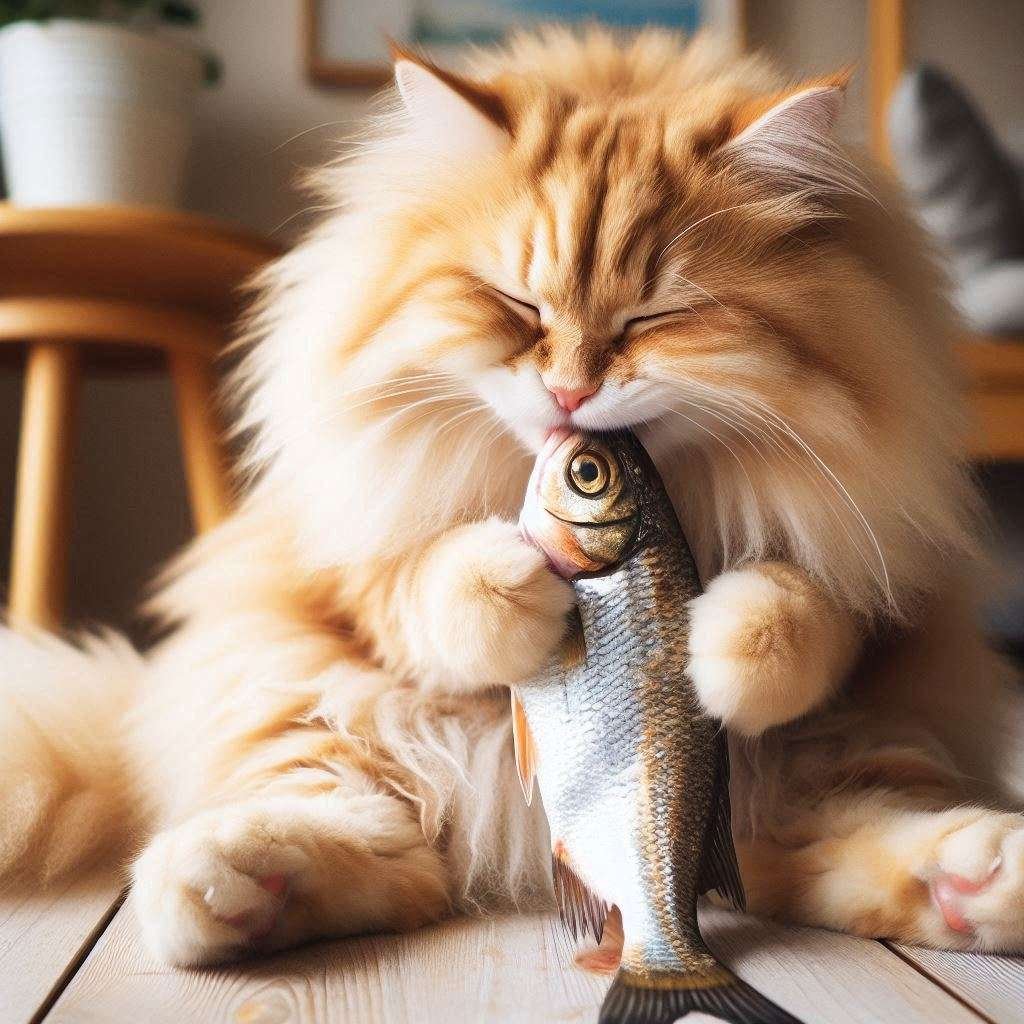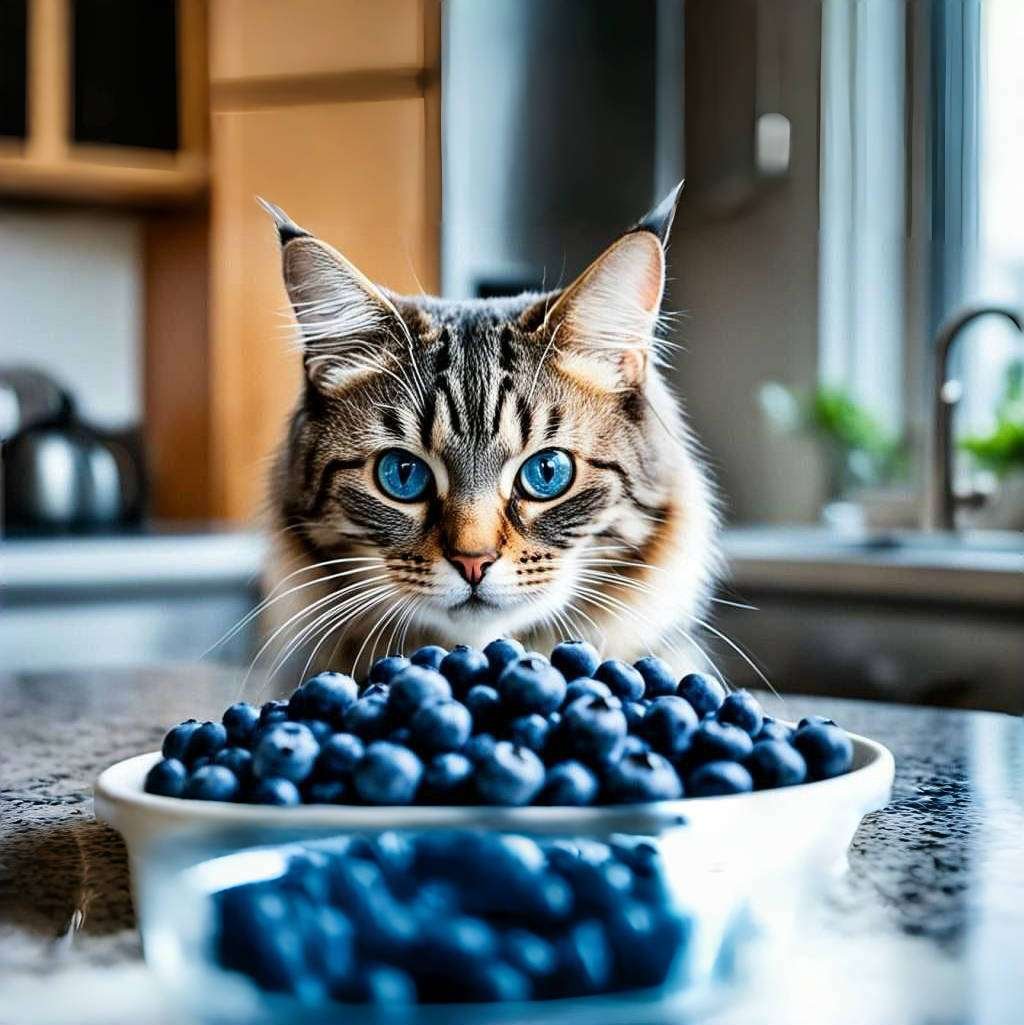Can my cat have whipped cream? Kitties are naturally curious and might seem interested in whipped cream. But, it’s best not to give it to them. Cats need nutrients from animal products to stay healthy. Whipped cream is mostly dairy, which can be hard for cats.
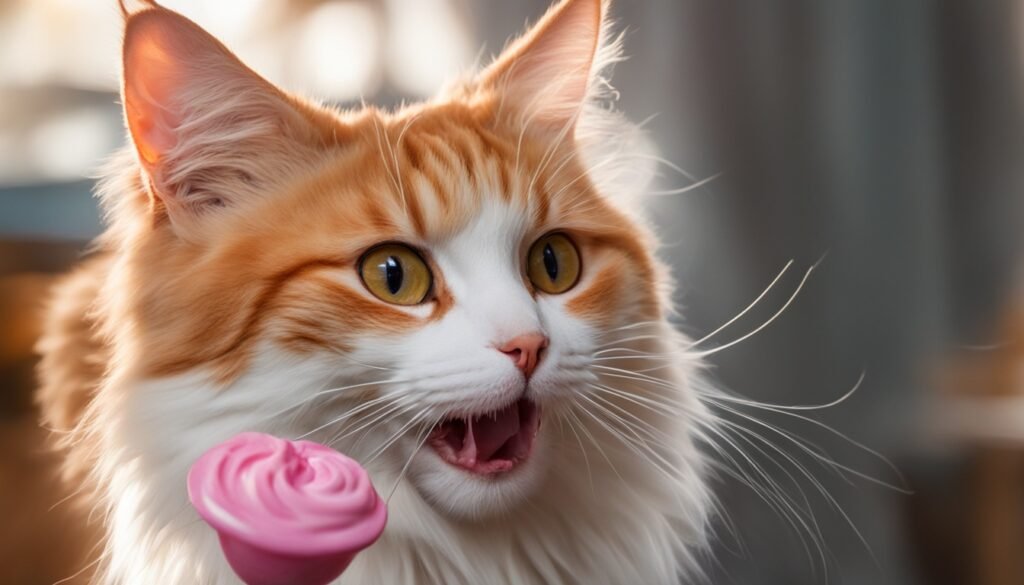
Key Takeaways
- Cats are obligate carnivores and have specific dietary requirements
- Whipped cream is primarily made from dairy, which can cause digestive issues in cats
- Overconsumption of whipped cream can lead to weight gain and other health problems in felines
- Some cats may tolerate small amounts of whipped cream, but moderation is key
- Safer treat alternatives, such as commercial cat treats or certain human foods, are recommended for cats
Understanding Your Cat’s Dietary Needs
Cats need animal-based nutrients for their health and well-being. They are built to digest and use the proteins, fats, and other nutrients from their prey. Commercial cat food gives them the right amounts of animal protein, vitamins, and minerals they need.
Cats as Obligate Carnivores
Cats must get most of their nutrients from animal sources. They can’t get enough nutrition from plants like some other pets. Their bodies are made to process the nutrients found in small prey.
Nutritional Requirements for Feline Health
For good cat nutrition and pet nutrition, cats need the right mix of feline diet items. This means high-quality cat food requirements with lots of animal proteins, fats, vitamins, and minerals. Treats should be less than 10% of their daily food.
| Nutrient | Importance for Cats |
|---|---|
| Protein | Essential for growth, maintenance, and repair of tissues. Cats require higher protein levels than many other species. |
| Fats | Provide a concentrated source of energy and support the absorption of fat-soluble vitamins. Certain fatty acids are essential for cats. |
| Vitamins | Necessary for a variety of metabolic processes, immune function, and overall health. Cats have specific vitamin requirements. |
| Minerals | Support bone health, muscle function, and other critical bodily processes. Cats need the right balance of minerals in their diet. |
Knowing your cat’s cat dietary needs helps you feed them right. This keeps them healthy and happy.
Lactose Intolerance in Cats
Most adult cats can’t handle lactose because they don’t make enough lactase enzyme. Kittens can digest dairy because their mother’s milk has lactose. But, as they grow and eat solid foods, they make less lactase. Eating dairy products like whipped cream can upset their stomachs. This can lead to gas, bloating, diarrhea, and vomiting.
Signs of Lactose Intolerance
The signs of feline lactose intolerance include:
- Lethargy
- Bloating
- Defensive posture
- Diarrhea
The Lactase Enzyme and Kittens
Kittens can digest their mother’s milk thanks to the lactase enzyme. But, as they get older, they make less of it. Most mammals, like cats, can’t handle lactose as adults because they don’t have enough lactase.
| Milk Type | Lactose Content |
|---|---|
| Cat Milk | 2-8% |
| Cow Milk | Higher than Cat Milk |
| Goat Milk | Lower than Cow Milk |
Cow and goat milk have more lactose than a cat’s milk. This makes them harder for adult cats to digest. But, some dairy like cottage cheese and yogurt might be easier for cats with lactose intolerance because bacteria break down some lactose.
“Lactose-free cow’s milk is a safer choice as an occasional treat for cats with no digestive issues.”
What Is Whipped Cream Made Of?
Whipped cream is a tasty topping many enjoy. But, it’s not good for our cats. The main parts of whipped cream – heavy cream, sugar, and sometimes vanilla extract – can harm cats.
Whipped cream is made by beating heavy cream until it’s light and fluffy. The cream’s high fat and sugar make it rich and creamy. But, these are not good for cats.
- Heavy cream: This is the main part of whipped cream, giving it a thick and creamy feel. But, its high fat is hard for cats to digest.
- Sugar: Whipped cream often has sugar added, which can lead to weight gain, diabetes, and other health problems in cats.
- Vanilla extract: Vanilla extract is often used to flavor whipped cream. But, it has alcohol that can be toxic to cats if they eat too much.
Since cats have special dietary needs, it’s best not to give them whipped cream. The ingredients can upset their stomachs and cause health issues. Instead, look for safe treats that are good for their diet.
“Cats should not eat whipped cream due to the ingredients it contains, such as dairy, sugar, and vanilla extract.”
Can my cat have whipped cream?
Sharing a sweet treat with your cat might seem appealing, but whipped cream isn’t a good choice. Cats need a special diet because they are obligate carnivores. Whipped cream has too much fat and sugar for them.
Cats can’t digest lactose well because they lack the enzyme lactase. This means eating whipped cream can cause stomach problems like vomiting and diarrhea.
Whipped cream is also high in calories and fat. Eating too much can make cats gain weight and lead to health issues. Cats should eat foods high in protein and low in carbs, not whipped cream.
If you want to give your cat a special snack, try cooked chicken, turkey, or plain, unsweetened yogurt. These are healthier and won’t harm your cat if eaten in small amounts.
Even a little whipped cream won’t hurt your cat right away. But it’s best to avoid it as a regular treat. Keeping your cat healthy should be your top priority when it comes to their diet.
Potential Dangers of Whipped Cream for Cats
Sharing whipped cream with your cat might seem like a treat, but it’s important to know the risks. Whipped cream is high in fat and has sugar and sweeteners. These can be bad for our pets.
High-Fat Content
Cats need a diet high in protein and low in carbs. Whipped cream’s high fat can cause weight gain and health problems.
Sugar and Sweeteners
Whipped cream often has sugars like glucose and fructose. These can lead to dental issues, diabetes, and metabolic disorders in cats. Some sweeteners, like xylitol, are toxic to cats.
Too much whipped cream can upset a cat’s stomach. It may cause vomiting, diarrhea, and stomach pain due to lactose intolerance.
Even lactose-free or vegan whipped cream can be bad for cats. It might have too much sugar or plant-based oils that cats can’t digest well.
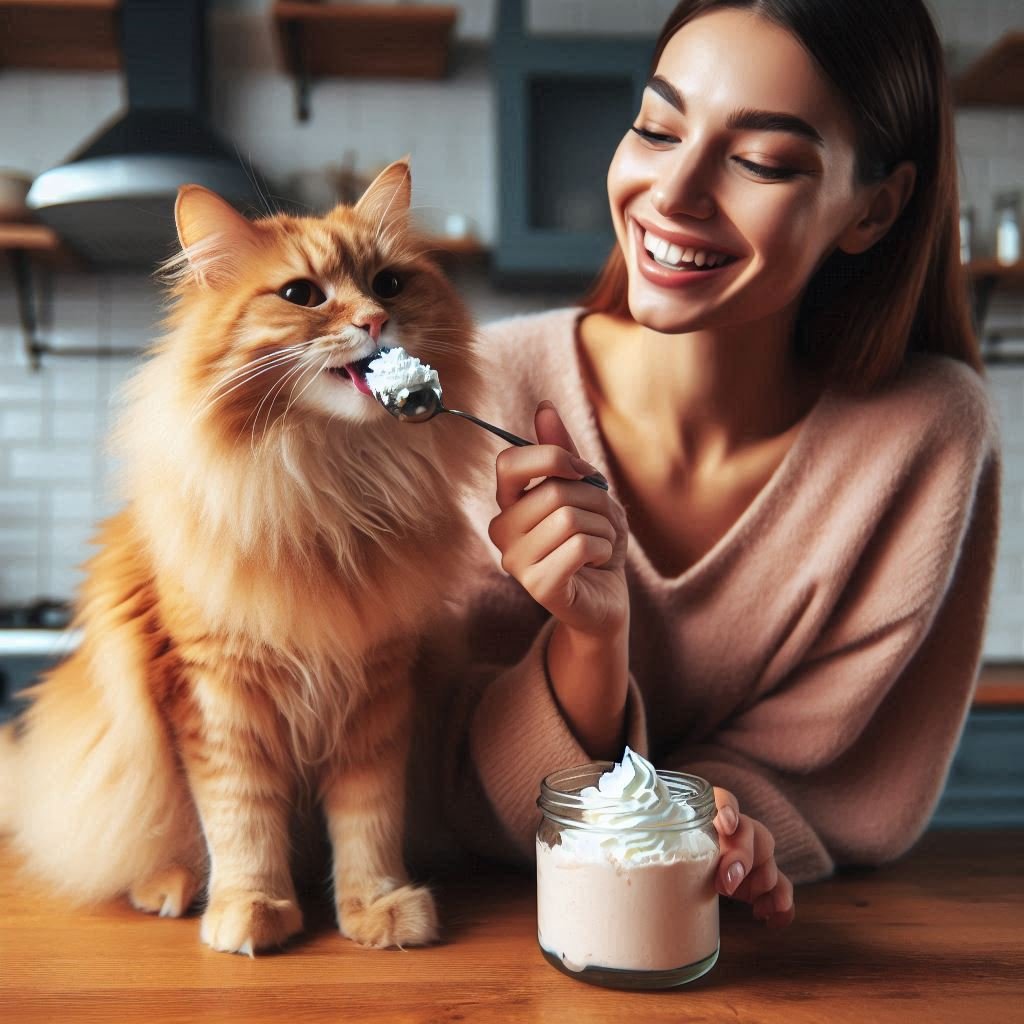
A little bit of plain whipped cream won’t hurt your cat right away. But it’s best to avoid it. The risks are greater than the benefits. Always put your cat’s health first.
Safe Treat Alternatives for Cats
Whipped cream might look like a tasty treat for cats, but it’s not a good idea. Cats can’t digest dairy well because they lack the enzyme lactase. Giving them whipped cream can cause stomach problems like diarrhea, vomiting, and pain.
Don’t worry, there are many safe and healthy treats for your cat. You can give them small bits of cooked chicken, turkey, or fish. These are full of protein. Fruits like peeled apple slices, blueberries, and strawberries are also good snacks.
Healthy Human Food Options
- Cooked chicken, turkey, or fish
- Peeled and cored apple slices
- Blueberries
- Rinsed strawberries
These foods are safe for cats and give them important nutrients and vitamins. Always give these treats in small amounts. Too many treats can make cats overweight and lead to health issues.
Choosing cat-friendly foods as treats lets you give your cat something special. It also keeps them healthy and happy for a long time.
Moderation is Key
Even if your cat likes whipped cream, it’s important to give it only a little bit as a special treat. Cats should mainly get their calories from their regular cat food. Giving them too much human food, like whipped cream, can make them gain weight and cause health problems.
About 65-75% of adult cats can’t digest lactose well. This can cause bloating, gas, stomach pain, and other digestive issues. Also, around 60% of cats in the U.S. are overweight or obese. So, it’s best to avoid giving them too many calories from treats like whipped cream.
When giving your cat new foods, like whipped cream, watch how they react. Start with a little bit and see if they have any digestive problems. It’s better to give them treats that are high in animal protein to match their natural diet.
Special cat treats like Kitty Whip are lactose-free and safe for your cat. But remember, even these treats should be given in moderation. Some cats can handle a little bit of dairy, but others might get an upset stomach or diarrhea.
Cats are meant to eat meat and need a diet high in animal protein and fat. Make sure they eat their regular cat food and don’t give them too many human treats. This keeps them healthy and happy.
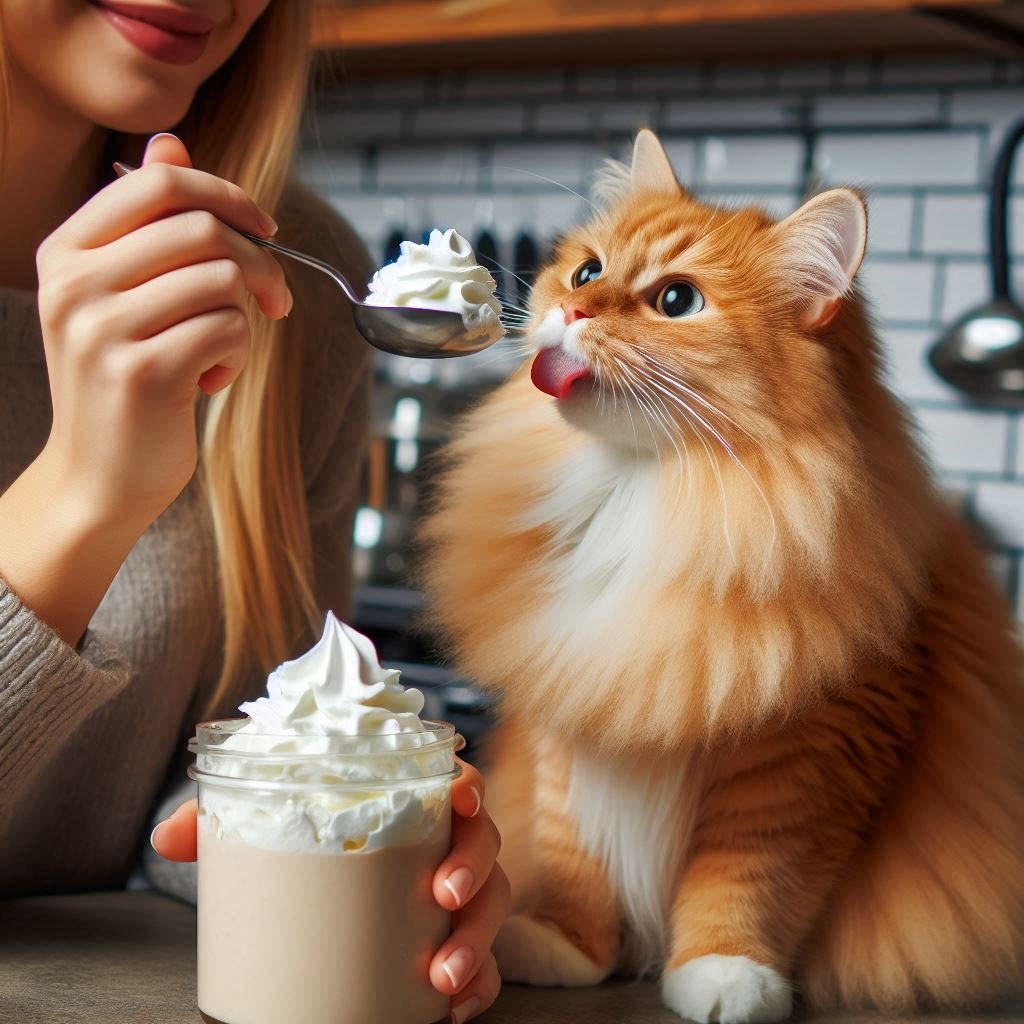
| Healthy Cat Treats | Unhealthy Cat Treats |
|---|---|
|
|
When to Consult a Veterinarian
When it comes to your cat’s diet and the safety of treats like whipped cream, it’s always best to consult with your veterinarian. Your vet can give you valuable advice on what foods are safe for your cat and what risks to watch out for.
If you’re not sure about a certain food or treat, or if your cat has stomach issues after eating something, get professional help. Your vet can tell you when to worry about your cat’s diet. They can also give advice on cat treats and how to feed your cat right.
Your veterinarian can check your cat’s health and suggest safe treat options. They can also warn you about the dangers of giving human foods to cats. Plus, they can help make a diet plan that fits your cat’s needs, keeping them healthy and happy.
Remember, it’s always safer to be careful with your cat’s diet. Talking to a vet can give you peace of mind and the right info to choose what to feed your cat.
“Cats are obligate carnivores, which means they need certain nutrients found only in animal-based proteins. Consulting a vet is crucial to ensure your cat’s dietary needs are met.”
Working with your veterinarian ensures your cat’s diet is safe, healthy, and right for them. This helps them live a long, happy life.
Conclusion
While whipped cream might look tasty, it’s not a good idea for cats. Cats can’t handle lactose well, and whipped cream has lots of fat and sugar. These can cause health problems if eaten too much. It’s best to feed your cat high-quality cat food and give them safe treats only sometimes.
Feeding your cat whipped cream often is not a good idea. They might get bloated, have gas, or diarrhea because they can’t digest the dairy and sugar. Even though a little bit of plain whipped cream isn’t toxic, it’s still better to avoid it. Stick to giving your cat healthy snacks that are made for them.
When thinking about cats and whipped cream, remember to be careful and know what your cat needs. Talk to your vet if you’re unsure about what foods are right for your cat. Keeping your cat healthy and happy means they can live a long and joyful life.

